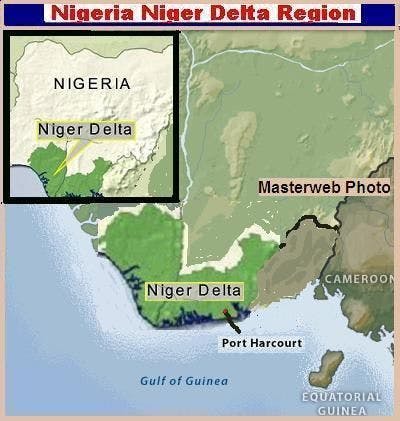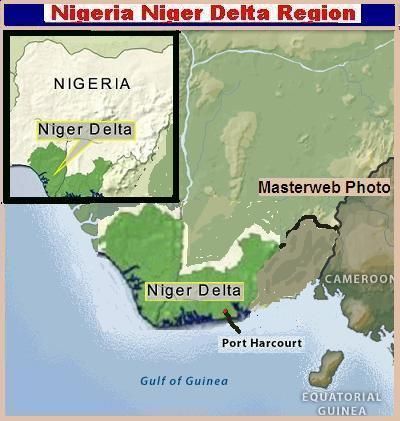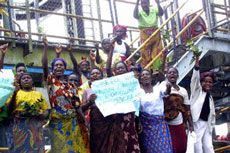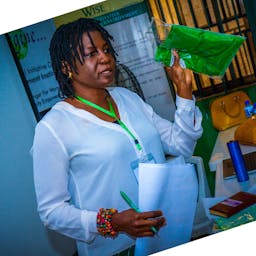PLIGHT OF THE NIGER DELTA WOMAN: CHEVRON GAS EXPLOSION UPDATE
Jan 21, 2015
Story



Gas Explosion and Affected Communities
Criticisms have continued to trail the recent Koluama oil fire occurrence in Bayelsa State, Nigeria. Koluama 1 and 2, Ekeni, Fishtown, Forupa, Ezetu1 and 2 and Sangana are host communities to Chevron Nigeria Limited, were badly affected. In the early hours of January 16th, 2012, a gas explosion occurred at the K.S. Endeavour (Panama) Rig, a facility belonging to Chevron Nigeria Limited while Fode Drilling Limited, a contracting firm to Chevron was drilling gas at the North Apoi Field in Koluama, located about five nautical miles from the communities. The explosion which led to a huge gas fire and massive spill killed two expatriates, a French and Indian. Their corpses were never recovered since the incident occurred, but, 154 workers on board the rig were safely evacuated. From the Koluama River, the huge flames could be sighted deep in the Atlantic Ocean; and the gas emitted dangerous gases and other toxic chemicals into the environment.
Through the Koluama River which empties directly into the Atlantic Ocean, polluted water was conveyed into the Koluama Rivers and creeks and other neighbouring communities in the coastline. Since majority of the people relied solely on these natural water courses for their daily domestic water needs, as they have no alternatives, many ended up falling sick. Of course, the dangerous gases and toxic chemicals that pervaded the air in the area further compounded an already horrific health situation. Relief materials, however, only began reaching the affected communities after over a month. According to a report, the Nigerian National Petroleum Corporation (NNPC), through the Minister of Petroleum, Mrs. Diezani Alison- Madueke, hurriedly conveyed some relief materials (foodstuffs) to Koluama on Monday, February 27, when President Goodluck Jonathan visited the community. Though, Chevron also sent some relief materials which included foodstuff and Medicare to the communities, indigenes maintained that the items were insufficient. All this while, the fire raged on until it was finally put out by the first week of March after generating so much controversy within and outside the localities.
Monumental Disaster and Government’s Response
Reports had it that the Nigerian Presidency sent the Nigerian Minister of Petroleum, for an on-the-spot assessment immediately the explosion occurred. It was also reported that the President also personally visited Koluama community on February 27, 2012 to empathize with the community and confirm the requirements for addressing the damage done to the community. On his entourage were the Ministers of Petroleum Resources, Environment and the Niger Delta, the Directors-General of the National Emergency Management Agency (NEMA), and the National Oil Spill Detection and Response Agency (NOSDRA) as well as top officials of the Bayelsa State government. Indigenes of the eight communities affected gathered at the town hall to hear from the President and also presented their harmonized position paper in which they articulated their short and long term needs.
Though President Goodluck Jonathan had visited the oil rig to see things for himself, human rights activists and opinion leaders in the State said that the President did not make a policy statement at Koluama, in spite of the monumental disaster done to the communities. They urged the Federal Government to stop treating the multinational oil companies with kid gloves. President Jonathan, nonetheless, reassured the people of Koluama communities in Southern Ijaw Local Government, Bayelsa State, that the Federal Government was totally committed to addressing the environmental problems in their area and the Niger Delta as a whole.
During the town hall meeting, the Governor of Bayelsa (the affected State) noted that the gas explosion that occurred in Koluama was a monumental environmental disaster which he described as a familiar event in the state and Niger Delta as a whole. His words: As we all know, what is going on in Koluama is very familiar event .We are used to it in the Niger Delta. It is the same story of sacrifice, the same story of inconveniences, living with risks day by day. We have been able to produce the mainstay of the nation's economy. What has happened in Koluama is the story of countless communities in Bayelsa state and across the Niger Delta. But, the least we can ask for Mr. President is the respect for our environment and protection of our very fragile ecosystem. He said, from all that I have been told, it is very clear that the environment of this area has been a much compromised one. We are told that they had a similar disaster in 1980, the Funiwa Texaco blowout. Then, we know that this area was heavily impacted in the early 90s as a result of the Mobil oil spillage that occurred somewhere offshore in Eket, Akwa- Ibom state. In January this year, we had a monumental environmental disaster, magnitude of which we are yet to fully assess. Let me assure you that your government is with you and will stand by you. The government appreciates your understanding and maturity and all the co-operation that you have shown to all the agencies. Members of the community were informed that government had constituted two main committees, which included the legal committee that would appraise the legal possibilities in terms of assisting the affected people in terms of asserting and enforcing state rights that is associated with this very serious environmental disaster.
Impact Assessment and Interest of the People
Under pressure from the government, the company involved, Chevron Nigeria Limited, working in concert with NOSDRA, put out the fire in the first week of March. An independent environmental consultant, Fugro Nigeria Limited, was also brought in to commence the testing of air, sea/river water, sediment, soil, fisheries and vegetation to determine any impact on the environment to complement the efforts of governmental agencies already at work at the site. The Presidential Adviser on Niger Delta Matters, Mr. Kingsley Kuku visited the island on March 6, on the direct orders of President Jonathan to commence skill acquisition programme for youths and women in the affected communities. The Nigerian President further directed the Ministry of Environment to conduct an Environmental Impact Assessment (EIA) in collaboration with Chevron. accordingly, the Ministry of Environment in collaboration with government agencies such as the Department of Petroleum Resources (DPR) and NOSDRA, have been at the site of the explosion, monitoring the environmental impact of the disaster and taking proactive measures to contain the spread of gas radiation or gaseous hydrocarbon leakage just as the University of Benin was mandated to launch an independent health assessment of local residents to manage any health risks from this incident.
The Senate Committee on Environment and Ecology also invited Chevron and other critical stakeholders for discussions, to ensure the containment and clean-up of the oil spill in the affected communities. This was contained in a statement signed and released by the Press Officer to Senator Bukola Saraki, the chairman of the committee. In the statement, made available the News Agency of Nigeria (NAN), the committee pledged to take the necessary steps to also remediate the impacted area. It said any losses and communities affected by the spill would be adequately compensated. In fact, it has now emerged that the incident might have triggered a significant oil spill, which has already hit the shoreline as observed by surveillance, with consequential impact on the environment. In view of this and the consequential impact, the Senate Committee on Environment and Ecology has been in consultation with the Senate Committee on Petroleum Upstream. It invited the Managing Director of Chevron, Director-General of NOSDRA and Department for Petroleum Resources (DPR), to work out an initial impact assessment of the contamination and begin immediate clean up of the area.''
The committee assured all Nigerians and the communities within the areas of impact; especially Koluama towns 1 and 2, Fishtown and Frupa that it would ensure that measures were taken to protect the communities and the wider Nigerian environment. The statement noted that the committee had just received a briefing that the Chevron offshore rig incident, initially reported on Jan. 12, 2012, as a gas explosion, did not tell the full story. The Nigerian Senate flayed Chevron Nigeria Limited for neglecting the victims of its recent oil rig fire outbreak at Funiwa field, about nine kilometers off the coast of Bayelsa State. The joint Senate Committees on Petroleum Upstream and Environment and Ecology told the oil company’s managing director, Andrew Fawthrop that palliative measures ought to have been provided “to cushion the effects of the loss of livelihood suffered by the people of the area”.
Agitations and the Indigenous Women
It is common knowledge now that the interests of the Niger Delta communities come to play, more often than not, only when or after colossal threatening impacts occur. The lives and livelihoods of these communities have remained in jeopardy; and the people have continued to suffer and endure many environmental degradation problems, especially those caused by oil exploration and logging activities in the region. The devastation arising from and resulting from oil explosions, fires, spills and logging are a source of great concern to affected, interested and concerned groups within and outside Nigeria. Even the European Union described the problem of gas flaring in the region, as “an environmental nightmare”. Environmental degradation problems continue unabated much to the detriment of the communities of this oil rich region. Fears and pains of the people remain heightened by the day as complicated and disastrous accidents involving oil spills and fires and related environmental disasters arising from the oil industry are usually treated and handled with so much laxity. Distress and poverty are words that best describes the condition of oil communities in Nigeria; as very little has been done in terms of infrastructural development to better the lives of the people in the past 40 years. Incidentally, many of the communities have no roads and lack potable water, standard school building and youth unemployment remains high among other challenges.
Women in this region are a source of pride as they are very industrious and hardworking; however, they remain the worst hit groups in terms of the devastation and deprivation that characterize their communities. They bear an enormous share of the costs of oil exploration to the people and the environment and constitute majority of the poor and uneducated in their communities. Listen to the Niger Delta woman, and she would tell you how the discovery of oil in the region has become more of a curse than a blessing to their people. They have loads of tales to share with a ready listener as they remain worried about their economic disadvantages, their unemployed children, as well as the lack of infrastructure and social amenities in their communities. From the women, you hear stories that touch the very fabric of their hearts. Many of them who make their living from farming, fishing and trading readily lament how much havoc oil spills in the regions have wrecked on their livelihoods, health as well as their once unspoiled environment. They lament how the waters that run through their communities have changed colour, become turbid, tastes terrible and is fast becoming of no use. Many alongside their husbands can no longer afford to meet their domestic needs, talk more of sending their children to school.
The plight of these women and their communities do not seem to matter, just as they no longer enjoy what nature has given to them. Until recent times, many of them were scared to assert their rights to a safe and healthy environment, as they readily recall the unjust killing of their sons, fathers, and brothers who dared to speak up. Notable amongst whom is Mr. Kenule Saro-Wiwa who was executed for organizing the most successful, people oriented campaign against the appalling environmental conditions in their region. The tale of the indigenous Niger Delta woman remains one of woes, as they continue to grapple with health, security threats which have become the lot of their communities. The indigenous women, their children and families have over the years helplessly witnessed devastating activities that destroyed their homes, farms, crops and water sources. Generally, in the women’s opinion, the multinational companies will dare not operate in their own countries, in the manner they do in Nigeria.
Though the women's voices have remained muffled over the years, recent turn of events reveal that they are beginning to actively participate in the agitations for environmental justice in their communities. Their voices are beginning to rise far beyond their communities, even though they have limited opportunities to participate in decisions that affect their community. The Niger Delta women have come off age and are beginning to join their male counterparts to demand for environmental justice across the region. It is necessary to recall the reported case of Itsekiri women from Ugborodo in the Warri area of Delta state who took over ChevronTexaco’s multibillion-dollar tank farm and terminal in Escravos, for 10 days. They had three main demands: employment opportunities for their children, greater economic empowerment, and an enhanced infrastructure. While it lasted, the blockade disrupted the production of an estimated 500,000 barrels of oil per day. Some 800 workers were trapped in the terminal after 400 of their colleagues were released by the protesting women. But the standoff came to an end after the oil company and the Ugborodo community signed a memorandum of understanding. Under its terms, the Nigerian National Petroleum Corporation/Chevron Joint Venture made a pledge to redress the community’s grievances. Specifically, it included regular offers of jobs to the people, establishment of income- and wealth-generating schemes, as well as the provision of school blocks, town halls, electricity, and potable water.
Interestingly, nine days into the invasion of Escravos by Itsekiri women, Ijaw women from Gbaramatu (also in Warri area) seized four flow stations belonging to ChevronTexaco, saying, “Gbaramatu kingdom has nothing to show for over 30 years of the company’s existence.” There was, however, no report of violence as the protest were stalled by the 7th Battalion of the Nigerian army who were moved to the flow stations to prevent any acts of vandalism, although their commander was reported as having given explicit instructions that the protesting women should not be molested. The radicalization of the Delta women is a phenomenon that presages the future color of agitation, not just in oil-producing states but eventually throughout the country if the status quo does not change.
The Way Forward
The desolation caused by exploration and logging operations across many communities in the Nigeria Delta is better left unimagined, as many of the people have become refugees in their ancestral land. In spite of the many celebrated plans to alleviate the plight of the people, much is still left to be achieved. Now that the fire has been put out and the immediate needs of some of the people met through the provision of relief materials, the need to ensure that adequate compensation is paid to the victims and or the affected communities, cannot but be emphasized. Beyond the immediate efforts made, adequate measures need to be put in place to protect the interest of the indigenous people, on the long term. The time has come when all hands must be on deck to uncompromisingly ensure that the hosts of Nigeria’s oil wealth truly enjoy and positively reflect this status, in every way possible. As an environmental rights advocate, I join my voice with the women of the Niger Delta to call on the three arms of the Nigerian Government to review the activities of all the companies operating in the Niger delta. As a matter of urgency too, policies that will engender sustainable development of the region should be put in place. It is only then, I believe, that the following mind boggling questions amidst many others will be laid to rest:
1. For how long more will the people be left to their fate?
2. Why must a hapless majority continue to bear the brunt of the injustices associated with the careless activities of a privileged few?
3. Why would oil rich communities in Nigeria continue to suffer the consequences of the problems they did not create?
4. How long will the people remain refugees in their own lands?
5. How long will they remain homeless, landless and neglected?
6. Will help ever come to them?
7. Is this just another case of man’s inhumanity to man?
8. Will the tales of woe that has become the lot of the Niger Deltans ever end?
9. Is anyone listening to their cries for justice equity and fairness? Should the cries of the Niger Delta people remain unheard?
10. Will the people’s nightmare ever end?
11. How could one of the best endowed regions of Nigeria and even the world, in terms of natural resources, biodiversity, and population densities, remain one of poorest and most threatened regions?
12. How long more are they expected to show understanding, maturity and co-operation?
13. To what extent are the people consulted with regard to developmental efforts in the region?
14. Is there any hope for a Niger Delta to sit on the Board of Niger Delta Development Commission?
To learn more about the plight of the Niger Delta people, please read a publication of Environmental Rights Action/Friends of the Earth, Nigeria; titled “Environmental Testimonies”.




